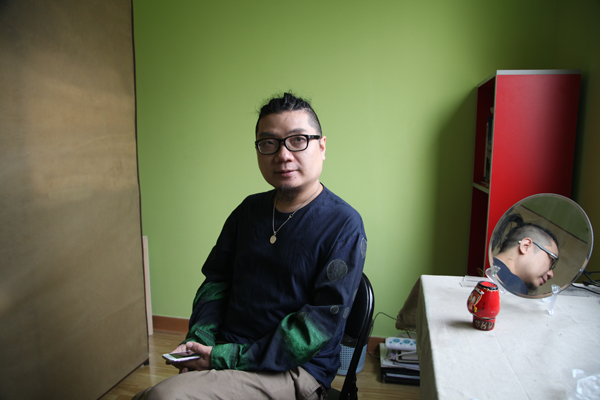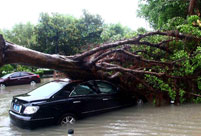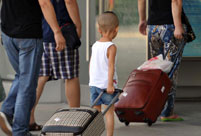 |
| Cheng Qingsong (China.org.cn) |
Scriptwriter, film connoisseur and gay activist Cheng Qingsong came out of the public closet in 2005. In this interview he talks about homosexuality in ancient, 1990s and present China.
Homosexuality, as in most areas of the globe, has always been part of Chinese culture. We find many homo-romantic scenes in the classical literature works – such as "Dream of the Red Chamber" – and Imperial China indeed did seem to be quite the romantic place! In fact, the Han Dynasty (220 BC - 221 AD) had no less than three emperors with male servant lovers on the side. A famous example is that of Emperor Han Aidi. Legend has it that the emperor was in bed with his lover Dong Xian one morning, when he had to attend court. Dong was sleeping with his head resting on the emperor's long robe sleeve and in a bid not to awaken his lover, Han Aidi cut off the lower half of his sleeve as an expression of love.
Homosexuality or gay people are obviously not mushrooms who simply popped up out of nowhere one day. In Cheng's own words, "We are historical and indeed global; but most of all, we are human. So how could anyone want to oppose us?"
What about gay life in Beijing during the 1990s? You yourself were there… I picture something reminiscent of Zhang Yuan's film "East Palace, West Palace."
"East Palace, West Palace" unquestionably wraps up the reality and atmosphere for gay people during that specific time. It was an underground playground. Gay people visiting the parks at night were in the enterprise of great secrecy, truly afraid of being exposed. At that time I had a "girlfriend" just to cover up. We would walk very close to one another to make people think we were a couple.
Actually, I rarely saw any other young people out in those public parks. Maybe they were simply too afraid. The vast majority would be middle-aged. I was only in my twenties! I wasn't afraid, just very curious and eager to see people who were like me. Nevertheless, I would occasionally come across a person my own age and they would all go something like, "Hey, it's totally boring here, the crowd is too small. There is a place over at Renmin University…" So at least you could get some valuable information around those parks. Of course, there weren't any cell phones at that time, but we all had our in vogue paging machines, ha-ha. You could find other peoples' pager numbers scribbled on the toilet walls at school.
"East Palace, West Palace," apart from depicting the gay life in 1990s Beijing, also says lots about power struggles. We have on the one hand a gay person, on the other the police who caught him. The two of them acting together are a metaphor for the life and political situation for gay people in China during that time.
What is the current condition of gay rights in China?
We have no legal guarantee. A few activists will each year hand in a gay marriage law proposal during the annual CPPCC and NPC plenary sessions (Lianghui), but the delegates never discuss the issue. Last year, the officials said it was still too early for a discussion on this topic in China. Personally, I think we all have to start from the very bottom, which is to say from the everyday activities that constitute us as human beings and then work upwards from thereon. The LGBT community is just one among many groups in society that need proper space in the law. We also need migrant workers' rights, women's rights etc. Therefore, the foundation should be a set body of group-differentiated rights. Afterwards, we can slowly make gay marriage a real thing.
There is no straightforward discrimination against us, it's just that the law neither supports nor denies gay rights. This is a Chinese phenomenon. Actually, discrimination against HIV-positive people is much more severe. We don't have a Putin who explicitly screams out his homophobia. Neither do we have media attacking us. Right now, there are no news articles portraying homosexuality as a major problem. Of course, if TV dating shows like "FeichengWurao (非诚勿扰, You Are the One)" could let the LBGT community in, that would be the ideal thing, but that is still very far off at this time.
The current situation for gay people in China is definitely dissimilar to the one in Russia, for example. On the one hand, Chinese society can be strict; yet on the other hand, there is some degree of free space, both for the individual and the mass media, to say what they want regarding homosexuality. Russia, however, with its so-called democracy is actually an autocracy. And the more autocratic a society is, the less accommodating it will be to minority groups. If I were Russian, I would have been arrested a long time ago, I suppose. But LBGT people only represent a different lifestyle. We do not constitute a threat to the stability of society. We naturally demand society to be tolerant, democratic and multicultural.
What remains the biggest obstacle right now?
I think it is still the question of legislation. Although it's not a problem that can be solved overnight, it's still the most important thing. By this I mean we must include the protection of a variety of rights for a variety of groups. Gay rights cannot be separated from an overall democratization of society.
 2013 Colour Me Rad 5K run held in Canada
2013 Colour Me Rad 5K run held in Canada China's destroyer Qingdao sails out of Sydney Harbor
China's destroyer Qingdao sails out of Sydney Harbor Chinese tycoon aims to restore London's Crystal Palace
Chinese tycoon aims to restore London's Crystal Palace Typhoon Fitow affects 4.56 million people in east China
Typhoon Fitow affects 4.56 million people in east China Game for the brave: 'Spiders' in Yandang Mountains
Game for the brave: 'Spiders' in Yandang Mountains Travel peak witnessed on last day of National Day holiday
Travel peak witnessed on last day of National Day holiday  New couples take wedding photos during holiday
New couples take wedding photos during holiday Serena Williams stumbles through to quarterfinals
Serena Williams stumbles through to quarterfinals Thailand Mobile Expo 2013 kicks off
Thailand Mobile Expo 2013 kicks off Photo collection of Chinese Navy
Photo collection of Chinese Navy Dense haze envelops N China
Dense haze envelops N China Twins Culture Festival kicks off in Beijing
Twins Culture Festival kicks off in Beijing UNESCO world heritage site: Montale Tower
UNESCO world heritage site: Montale Tower Israeli drone crashes into Mediterranean, fragments recovered
Israeli drone crashes into Mediterranean, fragments recovered Serena Williams wins second China Open title
Serena Williams wins second China Open titleDay|Week|Month